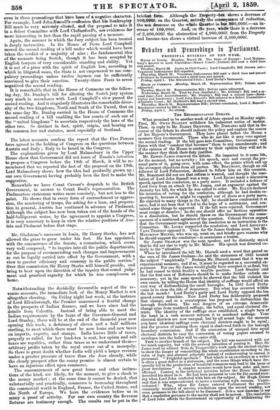Notwithstanding the decidedly favourable aspect of the re- venue accounts,
the immediate look of the Money Market is not altogether cheering. On Friday night last week, at the instance of Lord Ellenborough, the Premier announced a fearful change in the prospects of Indian finance, and we have since had the details from Calcutta. Instead of being able to meet the Indian requirements by the loans of the Governor-General and Lord Stanley, there will be at the end of the financial year now opening this week, a deficiency of eleven and a half millions sterling, to meet which there must be new loans and new taxes on imports, exports, and stamps. India knows little of taxes, properly so called, for her land-tax is rent, her opium and salt taxes are royalties, rather than taxes as we understand them— arbitrary profits taken by the royal owner out of a monopoly. So there is great doubt whether India will yield a larger revenue under a greater pressure of taxes than she does already, while the cloudy prospect after the sunny promise is almost certain to have an injurious effect upon commerce.
The announcement of new great loans and other intima- tions of the kind, are likely, for the moment, to give a shock to the money market ; at the same time it cannot be denied, that substantially and practically, commerce is increasing throughout the commercial world in England, France, the United States, and the North of Europe. We have the 'evidences before us in many a proof of activity. For our own country the Revenue Returns are testimony enough. The results can be put in the briefest form. Although the Property-tax shows a decrease of 900,0001. on the Quarter, entirely the consequence of reduction, the net decrease on the whole Quarter is but 800,000/.—an in- crease of 100,000/. And, on the year, while there is a decrease of 2,400,0001. the abstraction of 4,900,000/. from the Property and Income-tax shows a virtual increase of 2,500,000/.


























 Previous page
Previous page